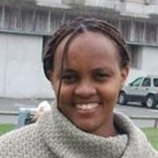Bio
Pamela Chepngetich is currently a lecturer at the faculty of Information Science & Technology at Kisii University, Kenya. Dr. Chepngetich holds a PhD in Media Studies from the University of Bayreuth, Germany, where she was a junior fellow at the Bayreuth International Graduate School of African Studies (BIGSAS). Her doctoral thesis there focused on the representation and self-representation of refugees in Kenya’s Daadab Refugee Camp. Her research interests are in representation, photography, social media and online activism as well as radio ethnography. Presently, her APN research probes how radio fan clubs are convened, and how they (un)consciously play a role in peace building in Western Kenya.

